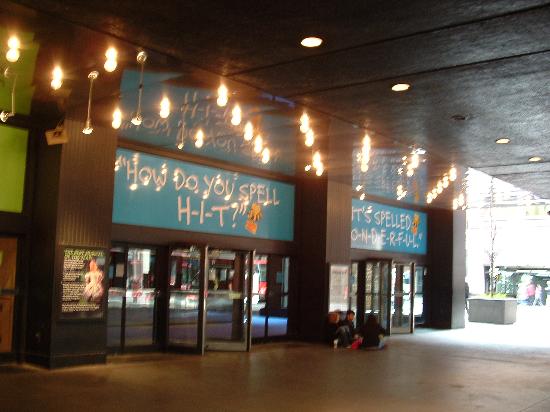The Boy Wonder of Broadway turns 90 today. Harold Prince, known as Hal. His name is a subliminal reference to Shakespeare’s Boy Wonder, Prince Hal, but the diminutive is really endearment, as he’s beloved by the entire community. After grabbing an Ivy League degree, he worked as a stage manager on shows like Call Me Madam, Wonderful Town and The Pajama Game – an apprenticeship, of sorts, under the Great Old Man, George Abbott, who, a generation earlier, had made a similar transition from stage manager to producer and director. At 27, Prince was a name-over-the-title producer of a big hit, Damn Yankees. And then New Girl in Town (a Tony-winner), West Side Story, and Fiorello!, By then he was 31.
Prince was so famous, he actually became a character in another Broadway show, Say Darling. This was based on a book about the creation of The Pajama Game, and all who saw it knew that Robert Morse’s character was based on the prodigious producer. I should note, here, that Hal Prince is also a character in the first musical I ever wrote. That was when I was 14, and didn’t think twice about putting living personages into my shows.
The shows I’ve mentioned so far were mostly crafted through a process in which the director exerts a great deal of influence over the writers, “shaping” the show without putting words on a page. I believe Prince is the last great practitioner of this. He became a director around the time Jerome Robbins stopped crafting shows for Broadway, and the torch was passed. Imagine how much Prince learned just from being in the room as Abbott and Robbins did their thing. All three were involved in A Funny Thing Happened on the Way to the Forum. The Abbott-directed farce starring Zero Mostel, Joel Grey and Karen Black was playing to mirthless near-empty houses in its out-of-town tryout. Time to call the doctor!– the show doctor, that is. Abbott, over his long career, had doctored many. But now he was so puzzled, he said “I like it; they don’t like it: We need to call in George Abbott.” Prince called in Robbins, who said “Nothing is wrong except the opening number.” (Love Is In the Air)
He sent Stephen Sondheim off to a room to write a new one, Comedy Tonight, staged it, and a hit was born. (They replaced Grey and Black, too.)
Nobody’s won more Tony Awards than Prince, and nobody has guided more masterpieces. An early example of what he did as a director is Cabaret, in which he came up with the idea that all the “on-stage” numbers at the Kit Kat Klub would comment on the rather realistic action in the rest of the play. So, the hero gets a financial windfall, but he doesn’t sing about it. Instead, there’s an incredibly energetic number about being suddenly rich. As the show goes on, the rise of the Nazis gets a twisted mirror reflection in increasingly sinister numbers such as If You Could See Her following an anti-Semitic incident. What once seemed charming has edged closer to evil. (More on this next essay.)
A character actor had written a handful of short plays about marriages and Prince thought they could be turned into a musical. But how? The writer had no idea. The largely-forgotten, then-rather-obscure songwriter Prince brought in didn’t know. But in talking with Hal, a notion emerged: to have a swinging bachelor observe these good and crazy people his married friends. Watching could lead to an epiphany. But is that a plot? Can you make a whole musical out of that? Only Hal Prince could. Fine as the Stephen Sondheim numbers are, it’s really the directorial magic that made Company a revolutionary hit.
So Prince and Sondheim continued to collaborate, and rack up Tonys, and each project was more audacious than the last. Follies, co-directed by Michael Bennett, added psychological underpinning to the type of songs their parents’ generation loved, so something obvious, like The Man I Love, is lampooned with something complex, Losing My Mind. A Little Night Music also took an outmoded form, operetta, and injected sexual subtext and Chekhovian wit. Pacific Overtures is a musical without a human protagonist (it’s about a country). And a melodramatic revenge tragedy, Sweeney Todd, took on a veneer of Brechtian societal criticism at Hal’s behest.
Years ago, I went to an exhibition at the Lincoln Center Library about Prince. One thing that particularly fascinated me was a long set of very specific instructions about the staging of Don’t Cry For Me, Argentina. He had an idea about every gesture, every look, what it all means to the character. Now, since I am not a genius, I read Tim Rice’s lyric and think it’s meaningless prattle. But Prince was able to turn that song – music by Johann Sebastian Bach (but inexplicably credited to Andrew Lloyd Webber) – into a piece with dramatic depth. Cabaret and the Sondheim shows demonstrated what Prince could do with strong material. Evita and Phantom of the Opera may be terrible shows on paper, but the staging made them palatable; hell, more than palatable: huge hits.
The last Prince-helmed show I saw was about a crackpot inventor who ties so many helium balloons to his lawnchair, he’s lifted high enough to create a problem for airplanes. And therein lies a metaphor for Prince’s career. Musical theatre can effectively deal with earthbound subjects if we remember to leaven the misery with just enough lightness. Political despotism shows up in three Prince-directed Tony-winners and yet they’re not miserable experiences for their audiences. Rare is the chef with a knack for stirring just the right amount of sugar into the pot. And, today, rarer still is the director who’ll take such an active hand in fashioning how the show is written. Prince is the last of a glorious breed.



 Posted by Noel Katz
Posted by Noel Katz 



